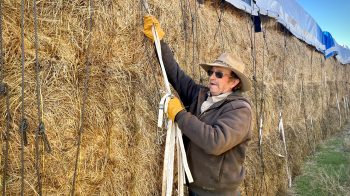TARP report card: didn’t fix ‘Too big to fail’
STEVE CHIOTAKIS: The big bank bailout from a couple years back kept the country’s economy from going into depression. That’s according to regulators of the Troubled Asset Relief Program. But did implementing TARP at the height of the financial crisis lower the risk of another one in the years to come?
Former Senator Ted Kaufman chairs the Congressional Oversight Panel, which oversees the TARP. Good morning Senator.
TED KAUFMAN: Good morning. How are you doing?
CHIOTAKIS: I’m doing well. Your last report — was TARP a success?
KAUFMAN: Well, it was like all things — it had some good things and bad things. The really positive thing is that you go back to the time when it was created that thought we were going into a depression and we avoid that so that was the good news. The other good news is that recently people were talking about it costing $700 billion, now we’re about $25 [billion]. The bad news is that by bailing out the banks, which was the basic part of the program, we set a moral hazard which means that we’re concerned about the banks could now feel they’re too big to fail and there for take risks that would be bad. And the second thing is I think it’s clear the program did a lot more for Wall Street than it did for Main Street.
CHIOTAKIS: You mentioned the risks that these big banks are still taking. Are we thinking differently now? Have the financial system habits of the past gone away?
KAUFMAN: Well, we don’t know. And I think the report to clear the panel’s very concerned about that I mean when you’re in a situation where you have the rating agencies giving better ratings to larger banks which seems to imply that they think they’re too big to fail, then that’s a very serious problem in terms of systemic risk and in terms of risk to the entire system.
CHIOTAKIS: What would happen had Treasury and Congress not gotten involved and there are no TARP.
KAUFMAN: That’s a good question. I think you never can go down a road that you didn’t travel. But clearly we did not have a depression which I think most people at the time, if we had to go back and see what the financial panic was, and clearly TARP was a piece of that. It would’ve been very bad if we had not put TARP in.
CHIOTAKIS: What lessons have we learned with TARP?
KAUFMAN: Well, I think we’ve learned that we’ve got to be careful about moral hazard, whatever we go into. we have to have programs that deal with everyone’s problems, not just Wall Street’s problems. And there probably should’ve been more limits on what Wall Street can do based on the money. We should’ve had a housing program that was much different than the one we had. A whole bunch of lessons like that.
CHIOTAKIS: Former Senator Ted Kaufman, chair of the Congressional Oversight Panel. Sir, thank you.
KAUFMAN: Thank you.
There’s a lot happening in the world. Through it all, Marketplace is here for you.
You rely on Marketplace to break down the world’s events and tell you how it affects you in a fact-based, approachable way. We rely on your financial support to keep making that possible.
Your donation today powers the independent journalism that you rely on. For just $5/month, you can help sustain Marketplace so we can keep reporting on the things that matter to you.


















